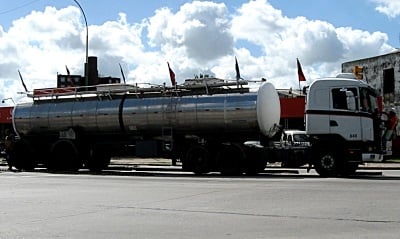How to Select the Best Diesel Fuel Stabilizer
The days when you could take diesel fuel, put it in a storage tank, and "set it and forget it" for months or years are long in the past. And they're...
2 min read
Erik Bjornstad : Apr 9 2015
Government action almost always takes longer than they say it will, and the shift to ultra-low sulfur diesel (ULSD) is a great example of this. They set an original deadline of 2006 to have all on-road diesel be ULSD. But it really took until later in 2007 or even early 2008 before ULSD for on-road use was universal in the marketplace.
For those who aren’t familiar, the rules mandating the removal of all sulfur down to just 15 parts per million was put into place to make the diesel fuel burn cleaner and produce lower levels of sulfur dioxide and sulfur trioxide gases, both of which contribute to acid rain and smog pollution.
The important modifier here is “on-road”. The EPA has always held an exception for off-road diesel, used in stationary engines, marine and locomotive applications. This was partly to make things easier because they didn’t want to hit everyone with these new restrictions at the same time.
Well, now the time has come that all of the off-road diesel is supposed to be ULSD. This means that people have had 7-8 years to get ready for the 2nd part of the transition. The EPA has allowed exceptions based on the size of the refinery, making large refineries product off-road ULSD earlier than small refiners. But the time has now come when everyone has to be all in.
For the typical diesel fuel user, the more important question is whether they can still use off-road ULSD if they happen to find it.
Up to this point, the rules have been pretty lax. If you had a boat or generator, you were probably still using diesel fuel with 500 ppm of sulfur. But the time is just about here when you won’t be able to get this for your boat or your diesel generator. It’s all going to be ultra-low sulfur diesel.
And those who have stores of high sulfur diesel fuel are going to have to find a way to get rid of it. This isn’t a problem for the average consumer. But for a power plant that has 6 million gallons of high sulfur diesel backup fuel, it is a big problem. What are they going to do with it? Because just a little bit of higher sulfur diesel left in a tank will make any ULSD in the tank out of compliance – If you were to add 50 gallons of ULSD to just one gallon of low-sulfur diesel, the whole mixture could be too high. And if the EPA starts cracking down with inspections and penalties for diesel users who are out of compliance for sulfur content, these people will really have a lot to worry about.
For those of us who don’t store millions of gallons of diesel, the main thing we have to worry about is the problems that ultra-low sulfur diesel will bring. Lubricity (how well the fuel lubricates injectors and fuiel pumps) was a worry back in 2007. But now they’re adding things at the refinery level that give the ULSD fuel the right amount of lubrication, so that’s not a big worry for diesel users. What they do have to worry about is the greater chance of microbes in the fuel tank. Sulfur was always a natural inhibitor of microbial growth, and the old high-sulfur and low-sulfur diesel fuels contained enough sulfur all you had to do to prevent microbes was keep water accumulation under control. The new ULSD fuels have changed all that, and diesel users with stored ULSD fuels are going to have to be a lot more vigilant in making sure they don’t let microbial growth in their fuel tanks get out of control.
The days when you could take diesel fuel, put it in a storage tank, and "set it and forget it" for months or years are long in the past. And they're...
Though it's not as common as it used to be, sometimes you may be driving and you notice a big diesel truck belching black smoke. Any time you observe...

Lots of people store fuel with the assumption that it’s going to be usable on demand – to do what they need it to do, when they need it. When this...